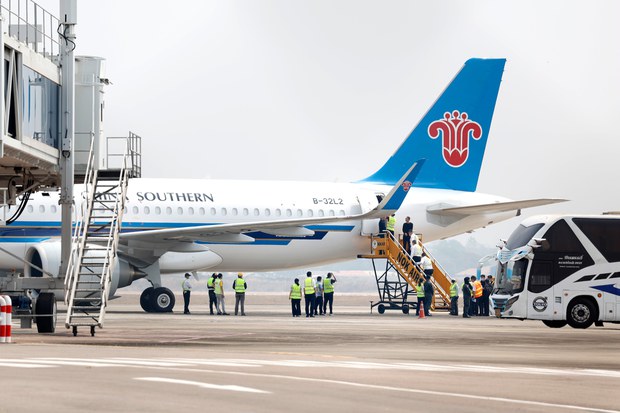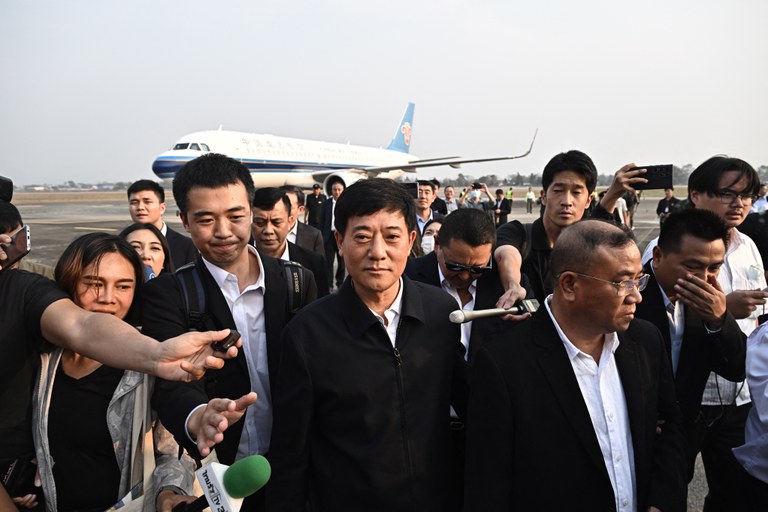Chinese workers from Myanmar scam centers begin to fly home from Thailand
2025.02.20
Mae Sot, Thailand
 Chinese nationals from a Myanmar scam center board a China Southern Airlines plane at Thailand’s Mae Sot airport for a flight to China, after being transferred from Myanmar’s Myawaddy town on Feb. 20, 2025.
Chinese nationals from a Myanmar scam center board a China Southern Airlines plane at Thailand’s Mae Sot airport for a flight to China, after being transferred from Myanmar’s Myawaddy town on Feb. 20, 2025.
Hundreds of Chinese nationals who worked at online fraud centers in eastern Myanmar began to head home on Thursday from an airport in the Thai border town of Mae Sot, Thai officials said.
The 200 Chinese nationals were brought on buses, 50 at a time, from Myanmar’s Myawaddy district, over a border bridge to Mae Sot, and then taken to a nearby airport for their flight home, witnesses said.
“Myanmar authorities and the Border Guard Force have brought Chinese nationals to the second Thai-Myanmar Friendship Bridge, and are handing them over to Thai officials,” Maj. Gen. Maitree Chupreecha, commander of the Thai military’s Naresuan Task Force, told reporters.
“A total of 200 people will be repatriated today in groups of 50 every two hours.”
It was not clear whether the people being flown back to China were organizers of the fraud or victims of human traffickers who forced them to scam people online and over the telephone.
Such fraud centers have proliferated in recent years in Myanmar and other parts of Southeast Asia.
A first flight left Mae Sot bound for China shortly before noon. Three more were due to leave through the day.
More flights to China are set to fly more than 1,000 Chinese people home on Friday and Saturday, Thai officials said.
RELATED STORIES
China pushes Thailand to act on cross-border scam centers
EXPLAINED: What are scam parks?
Myanmar militia hosting scam centers says it will deport 8,000 foreigners
Thursday’s repatriations were the latest in a series of actions over recent weeks aimed at ending the scam center operations that have flourished largely unimpeded in different parts of Southeast Asia for several years.
Known as “pig butchering” in China, the scams involve making contact with unsuspecting people online, building a relationship with them and then defrauding them.
Researchers say billions of dollars have been stolen this way from victims around the world.
Huge fraud operation complexes are often staffed by people lured by false job advertisements and forced to work, sometimes under threat of violence, many rescued workers and rights groups say.
Thousands of victims
Researchers have said governments and businesses across the region have been enabling the operations by failing to take action against the profitable flows they generate.
But that has changed in recent weeks amid a blizzard of bad publicity triggered by the kidnap and rescue last month of Chinese actor Wang Xing, who was lured to work one of Myawaddy’s fraud operations.
The growing public alarm across Asia about kidnapping and forced labor threatened to damage Thailand’s tourist industry and forced China to insist on action by authorities in its southern neighbors to crack down.
China’s Assistant Minister of Public Security Liu Zhongyi visited Thailand in late January to focus efforts to combat the call center operations and the human trafficking that supplies their labor force.

Thailand took its most decisive action ever against the fraud networks on Feb. 5, cutting cross-border power and internet services and blocking fuel exports to the Myanmar scam zones.
The Myanmar junta also stopped fuel shipments to the Myawaddy district controlled by an ethnic minority militia force that is allied with the military government.
The ethnic Karen militia that controls Myawaddy and has been hosting and profiting from the online fraud operations said last month it was going to stop fraud and forced labor and send back thousands of the people who have been working in the centers.
A Thai activist group, the Civil Society Network for Victim Assistance in Human Trafficking, which has been helping scam center victims, said it has identified at least 2,000 people from more than a dozen countries forced to work at defrauding people around the world.
But thousands more are likely still working at the scam centers in eastern Myanmar and beyond.
A Thai member of parliament and head of its National Security Committee said it was important to collect as much detail as possible from people being brought out of the scam centers to identify the kingpins and end their operations once and for all.
“We need to gather information,” legislator Rangsiman Rome told reporters.
“We must verify if they are victims or criminals and whether they know who is behind the call center gangs,” said Rangsiman.
“This information is crucial for dismantling the transnational crime syndicates.”
Radio Free Asia is a BenarNews-affiliated news organization.







